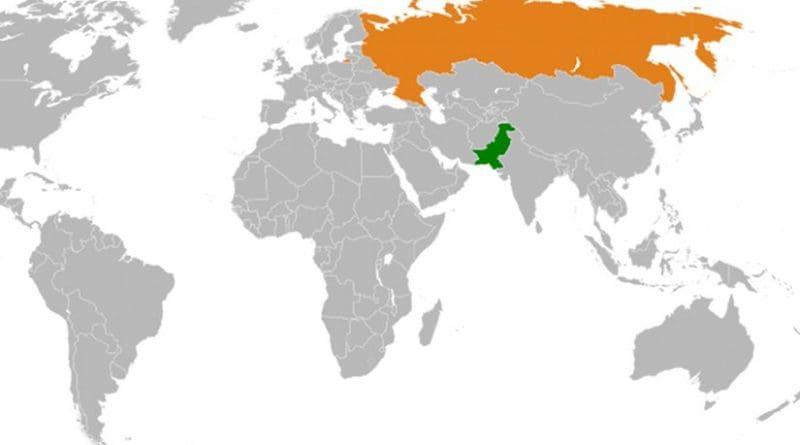Pakistan-Russia Relations: From Soured To Friendly Ties – OpEd
Pakistan gained independence from the British rule on August 14, 1947. This was a time when world was divided into two blocs, i.e. the western (Capitalist bloc) led by the United States and the other was Eastern (Communist bloc) led by the USSR. The infant Pakistan and India had to choose their bloc. The USA and USSR both invited Pakistan and India to visit them. Pakistan opted to visit the USA and refused USSR.
The emergence of Pakistan in August 1947 was not seen as a positive development in Moscow. The Soviet Union regarded the division of the Indian Subcontinent as ‘the divide and rule’ strategy of British policy in India, and had earlier categorized the Muslim League as a tool of the British, from its very inception Keeping in view, Pakistan and India relationship has been marred with conflicts ever since their independence and have been involved in three major wars, where USSR helped India against Pakistan in the Kashmir dispute by giving them economical and technical support.
In 1955, Pakistan joined CENTO & SEATO, which USSR took as a firm assertion in the favour of USA. Although Pakistan joined it against India except any other country including USSR and Pakistan had resigned against that membership for non provision of any assistance against India. USSR offered aid to Pakistan at an agreement of breaking alliance with USA. On reply to this condition, Pakistan not only refused the offer but also allowed USA to perform their intelligence activities from Badaber base.
In 1960, a U-2 spy plane was shot down by an S-75 Dvina while performing photographic aerial reconnaissance in the soviet airspace, causing great embarrassment for both Pakistan and the US. Initially US covered up the story by claiming that U-2 was a NASA aircraft that had gone missing north of Turkey. Later, President Eisenhower had to eventually admit the mistake after Soviet showed the missing U-2 pilot, Francis Grey Powers, and pictures of Soviet bases. In response, an angry Khrushchev thundered, “from the lofty rostrum of the Supreme Soviet, we warn those countries who make their territory available for launching planes with anti-Soviet intentions: Do not play with fire, gentlemen! The governments of Turkey and Pakistan must be clearly aware that they are accomplices in this fligh, If these governments did not know – and I allow in this case they were not informed – they should have known what the American military was doing in their territory against the Soviet Union”.
Two days later, Khrushchev confronted Pakistani ambassador Salman Ali at Czechoslovakia embassy reception and warned that ‘Peshawar had been marked on a map and pinpointed by Soviet rockets’. After Russian response, the President of Pakistan Ayub Khan in his memoirs noted that ‘in the U-2 incident we were clearly at fault, and also admitted that it was a secret agreement between Pakistan and US. He opened another interesting fact that Francis Gary Powers mission was codenamed ‘Operation Grand Slam’.
In 1965, Pakistan also gave the codename ‘Operation Grand Slam’ to its offensive in Kashmir and Pakistan’s perception of US support against the ‘’Indian Threat’’ in the hour of need was muddled up. When US cut funds for Pakistan by 73%. By knowing that, US was Pakistan’s sole arms supplier while India had multiple arms suppliers, the decision to suspend military aid would comfort India but devastate Pakistan. Bhutto told McConaughy that ‘Pak, cornered, deserted… had no alternative but interpret US action as a punitive one assisting India, a non-aligned and treacherous country aggressing against US ally.’ The US arm embargo on Pakistan was seen as the first betrayal. The relation between US and Pakistan become deteriorated. Resultantly, Pakistan and USSR get closer. In 1966, Soviet played mediator role and hosted a peace conference between Pakistan and India. This conference was aimed at helping Pakistan to develop good relations with India. This led Pakistan and USSR relations developed to its extreme and compelled Americans to close their Air Base from Peshawar and Soviet began to supply arms to Pakistan.
In 1971, Pakistan played a major role and arranged a dialogue between US and China to reduce tension between them. This annoyed Soviet as it implied a good relation between US, China and Pakistan. After this, Relation between Pak-Soviet started to worsen a bit. Soviet signed a treaty of peace and cooperation with India and guaranteed Soviet help if India went to war with Pakistan. In 1972, Bhutto visited Soviet with a hope to remake good relations with Soviet. During his visit, USSR agreed to build steel mills and provided interest free loans to Pakistan. Russia and Pakistan relations had some positives and much trumpeted negatives.
Many opportunities to thaw the strained relations were missed either due to Pakistan’s pro- western stance or suspicions on Russian-Indian alliance. Despite of unenviable past, there seems to exist much potential of developing Russian and Pakistan bilateral cooperation in the field of diplomacy, trade, economy, science technology, and mining, prevention of drugs, extremism and terrorism.
In recent years, Pakistan and Russia carried out their first ever joint military despite of Indian request to postpone due to Uri attack and also signed various agreements related to gas pipeline. Pakistan has also granted Russian access to warm water port in the Arabian sea, Gawadar Port. Both countries interact at the common forum of SCO and OECD. The military visits and diplomatic strategic relations between Pakistan and Russian Federation is a step towards better relations on both sides.
Pakistan has now realised that close neighbours are more important than distant relatives.

